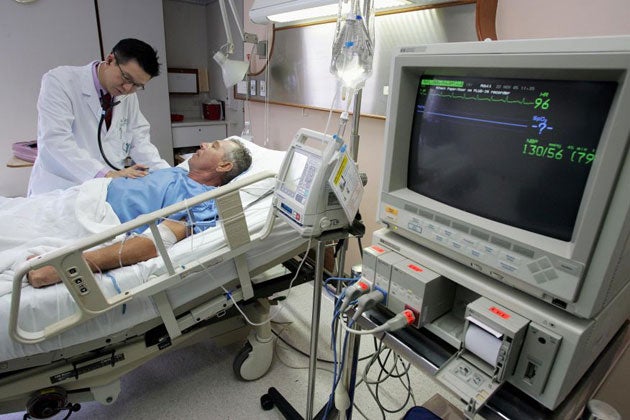Global shortage of isotopes puts hundreds of cancer scans in doubt

Your support helps us to tell the story
From reproductive rights to climate change to Big Tech, The Independent is on the ground when the story is developing. Whether it's investigating the financials of Elon Musk's pro-Trump PAC or producing our latest documentary, 'The A Word', which shines a light on the American women fighting for reproductive rights, we know how important it is to parse out the facts from the messaging.
At such a critical moment in US history, we need reporters on the ground. Your donation allows us to keep sending journalists to speak to both sides of the story.
The Independent is trusted by Americans across the entire political spectrum. And unlike many other quality news outlets, we choose not to lock Americans out of our reporting and analysis with paywalls. We believe quality journalism should be available to everyone, paid for by those who can afford it.
Your support makes all the difference.A global shortage of radioactive imaging agents vital to the diagnosis of cancer and other diseases threatens to delay treatment for hundreds of patients in Britain.
Specialists warned yesterday that UK hospitals are receiving less than half the expected supplies of medical isotopes used in heart and bone scans and some cancer detection procedures, and the situation is expected to worsen over the coming weeks. The isotopes are used in more than 80 per cent of routine nuclear imaging tests used to diagnose disease. Professor Alan Perkins, honorary secretary of the British Nuclear Medicine Society, said: "The expected number of people who will be affected is quite difficult to determine ... but we are certainly talking about hundreds. The procedures include cardiac blood-flow imaging, bone scanning for secondary tumours, lymph-node detection in breast cancer cases and renal function monitoring, which is commonly done in children.
Professor Perkins warned that the Government target to scan patients within six weeks could mean some receiving "sub-optimal treatment" as a result of the shortage. "Patients may be put through inappropriate tests so that they do not breach the [deadline]," he said.
Doctors would have the option to use alternative tracers or imaging methods, such as magnetic resonance tomography, in some non-urgent cases.
The warning is contained in a letter published by the British Medical Journal. The shortage has been caused by the temporary closure of reactors that produce the isotopes. Europe's three reactors have shut for maintenance, and producers have only enough isotopes to last until Monday.
A Dutch reactor was shut down last month after gas bubbles were discovered escaping from a pipe. It satisfied more than 25 per cent of global demand and more than half of that in Europe. Two other reactors in France and Belgium are also closed.
Reactors in Canada and South Africa are also down, leaving only one in Australia – which lacks the capacity to increase supply significantly. In the US, more than 50,000 examinations were affected following the closure of the Canadian reactor for two months in 2007.
The specialists warn that this is not just a short-term emergency as most of the commercial reactors are 40 years old and new capacity is urgently needed.
A spokesman for the Department of Health said: "Trusts will be working to ensure that patient care is not compromised.Urgent patients will continue to be prioritised [but] routine patients may need to wait a little longer until supply comes back online."
Join our commenting forum
Join thought-provoking conversations, follow other Independent readers and see their replies
Comments